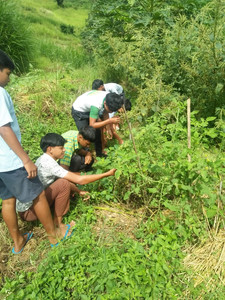Sustainable Organic Farming Practices for Food Security
- ebpp1998
- May 13, 2024
- 1 min read
I Wayan Ngurah, EBPP Agricultural Program Facilitator

The unusual weather this year brings joy to Manikaji junior and senior high school students, involved in our regenerative agricultural programs because the rainy season usually ends in March, but this year it was still rains until April, providing a longer opportunity for farming their family land.
Our Manikaji students did not waste this opportunity and used vegetable seeds saved from the previous harvest as the source of seeds to replant various types of vegetables such as tomatoes, pak coy, green vegetables, and eggplants in their school learning garden.
Before planting, the students loosened the soil and added organic fertilizer that they make together with their schoolmates. After planting, they used mulch to preserve soil moisture and prevent weed growth. Besides planting in the learning garden, they also planted on their prepared land at home, allowing them to compare yields and understand the difference in the growth of their vegetable crops.
Now, the seeds they planted are thriving and have begun to be harvested. They us their harvested vegetables to meet the nutritional needs of their family. Through this process, they learn not only about sustainable dryland organic farming, but also about responsibility, hard work, and sharing results with others.
The lessons learned from this sustainable agriculture program open the door to a more sustainable future because they have now seen the great potential in their ability to manage more land in the future.
















Comments